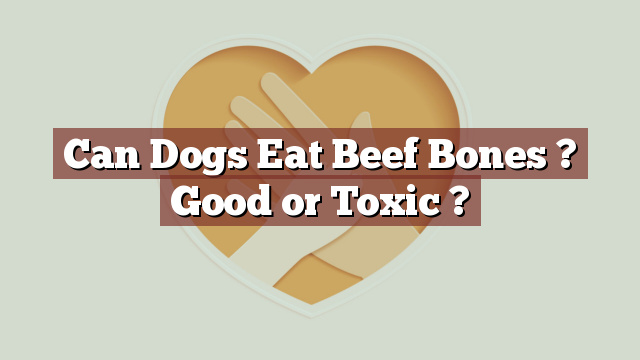Can Dogs Eat Beef Bones? Good or Toxic?
Knowing what foods are safe for our furry friends is essential for their overall health and well-being. In this article, we will explore whether dogs can safely eat beef bones or if they pose any potential risks. We will also discuss the nutritional value of beef bones and provide guidance on what to do if your dog happens to consume one.
Nutritional Value of Beef Bones
Beef bones are a rich source of several essential nutrients that can benefit dogs. They contain calcium, phosphorus, and magnesium, which are crucial for maintaining healthy bones and teeth. Additionally, beef bones are packed with protein, which is essential for muscle development and repair. These bones also provide essential fatty acids and vitamins, such as vitamin A and vitamin E, which contribute to a dog’s overall health.
Can Dogs Eat Beef Bones? Safe or Toxic?
Can dogs eat beef bones? The answer is both yes and no. Dogs can safely eat raw, meaty beef bones that are specifically intended for canine consumption. These bones are softer and more pliable, making them less likely to splinter and cause harm to your dog’s digestive tract. However, it is crucial to avoid cooked beef bones as they can pose serious risks to your dog’s health.
Cooked beef bones become brittle and are more likely to splinter, which can lead to serious injuries such as broken teeth, choking, or internal blockages. The sharp fragments can cause lacerations in the mouth, throat, and gastrointestinal tract. Therefore, it is vital to only offer raw beef bones that are appropriate for dogs to ensure their safety.
Potential Risks and Benefits of Feeding Beef Bones
Feeding raw, meaty beef bones to dogs can have several benefits. Chewing on bones can provide mental stimulation for your pet and help keep their teeth clean by reducing plaque and tartar buildup. The act of gnawing on bones can also provide a satisfying outlet for your dog’s natural chewing instincts.
However, it is essential to be aware of the potential risks associated with feeding bones. As mentioned earlier, cooked beef bones can splinter and cause serious injuries. Even with raw bones, there is still a risk of choking or gastrointestinal blockages if your dog swallows large pieces. Therefore, it is crucial to supervise your dog while they are chewing on bones and remove any small or sharp pieces that may pose a danger.
What to Do if Your Dog Eats a Beef Bone
If your dog accidentally consumes a beef bone, it is important to take immediate action. Firstly, do not panic. Assess your dog’s behavior and look for any signs of distress or discomfort. If your dog appears to be in distress, experiences difficulty breathing, or shows signs of choking, it is crucial to seek veterinary assistance immediately.
If your dog seems fine after consuming a beef bone, monitor them closely for the next few days. Watch out for any signs of gastrointestinal distress such as vomiting, diarrhea, or constipation. If you notice any abnormal behavior or symptoms, it is best to consult your veterinarian for further guidance and advice.
Conclusion: Weighing the Risks and Benefits of Feeding Beef Bones to Dogs
In conclusion, dogs can safely eat raw, meaty beef bones that are suitable for canine consumption. These bones provide several nutritional benefits and can contribute to your dog’s overall health and well-being. However, it is crucial to avoid cooked beef bones as they can splinter and cause serious harm to your pet.
While feeding beef bones can have numerous benefits, it is important to be aware of the potential risks involved. Supervision is key to ensure your dog’s safety, and any signs of distress or abnormal behavior should be addressed promptly by a veterinarian. Ultimately, it is up to pet owners to weigh the risks and benefits and make an informed decision regarding the inclusion of beef bones in their dog’s diet.
Thank you for investing your time in exploring [page_title] on Can-Eat.org. Our goal is to provide readers like you with thorough and reliable information about various dietary topics. Each article, including [page_title], stems from diligent research and a passion for understanding the nuances of our food choices. We believe that knowledge is a vital step towards making informed and healthy decisions. However, while "[page_title]" sheds light on its specific topic, it's crucial to remember that everyone's body reacts differently to foods and dietary changes. What might be beneficial for one person could have different effects on another. Before you consider integrating suggestions or insights from "[page_title]" into your diet, it's always wise to consult with a nutritionist or healthcare professional. Their specialized knowledge ensures that you're making choices best suited to your individual health needs. As you navigate [page_title], be mindful of potential allergies, intolerances, or unique dietary requirements you may have. No singular article can capture the vast diversity of human health, and individualized guidance is invaluable. The content provided in [page_title] serves as a general guide. It is not, by any means, a substitute for personalized medical or nutritional advice. Your health should always be the top priority, and professional guidance is the best path forward. In your journey towards a balanced and nutritious lifestyle, we hope that [page_title] serves as a helpful stepping stone. Remember, informed decisions lead to healthier outcomes. Thank you for trusting Can-Eat.org. Continue exploring, learning, and prioritizing your health. Cheers to a well-informed and healthier future!

